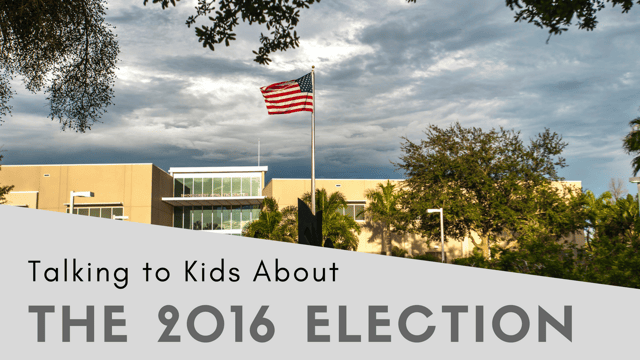
The 2016 election season may be the first in which the term “mudslinging” is too gentle to describe the kinds of rhetoric and even physical violence that we have seen over the past several months. As teachers and parents, our enthusiasm about the democratic process is likely not at an all-time high. And yet, this is exactly the moment to talk with our children about the role of a citizen in our democratic republic. If we are seeing the same kinds of behaviors in the 2032 election, we will have no one but ourselves to blame.
But where do we start?
Perhaps first, we should begin by reflecting on the kinds of citizens we want our children to become. As an educator, I have my own vision of the Shorecrest graduate as a United States citizen. Here it is.
At Shorecrest, I want to graduate citizens who…
- know how to engage in respectful discourse
- critically evaluate information, with an awareness of diverse perspectives
- can present compelling arguments for their position, supported by evidence
- consider policy issues with an eye to social justice and a compassionate heart
- feel empowered to impact local, state, and national policy through civic action
The time to begin developing those attributes is not in junior year AP US History. It is much earlier than that. Even infants have been found to possess an innate sense of justice. If we want to graduate compassionate, respectful, knowledge-seeking citizens, we need to start at the earliest levels.
Here are a list of strategies that both parents and teachers can use to promote positive conversations around the election and the political process this election season.
Focus on the Process
How exactly do we select our elected representatives? Teaching children about voting is a wonderful entry-point into the world of citizenship education. It has the advantage of being a nonpartisan topic, as well as engaging your child’s natural desire to be involved in decisions.
Try setting up a secret ballot for tomorrow night’s dinner menu or Saturday’s family movie night pick. (Watch out for voter fraud, mom and dad!) Voting on “issues” that directly affect them engages children in the process and helps them to understand what is happening in the wider world.
When election day arrives, celebrate your right to vote along with your children by taking them with you to the voting booth. Emphasize how important it is to you to cast your vote for your preferred candidate. Model good citizenship by explaining how you researched and chose that candidate.
Engage Children in Thoughtful Discourse
For younger children, a good entry point into election-season conversations is through their imaginations. What would you do if you were President? How do you think you could accomplish your goals? These kinds of questions make wonderful conversation topics for long car rides or family dinners.
For children old enough to be curious about the issues, the language that we as adults use is critical. Don’t be afraid to be direct when sharing your thoughts on election year issues. In the course of a conversation about a national issue, children are likely to be curious about the opinions of the important adults in their lives. It would be false for us to pretend that we are neutral on a topic of national importance.
That being said, how do we share our thoughts without exerting undue influence on our children or creating unnecessary friction in our community? By framing our views as our own, we implicitly acknowledge that others feel differently.
“I believe that more money should be spent on national defense.”
“The issue of access to higher education is important to me because I am concerned about the high cost of college tuition.”
Whenever possible, invite children into the conversation around the issue at hand. Try some of these questions: Do you think this is an important issue? If so, why? Can you give an example of what you think would happen if we elected a President who supported this position? Why is this issue so difficult to decide?
Examine Campaign Materials Together
Is there an election ad running on TV? Great! Ask your child what he or she notices in the ad. What do you think the creators of the ad want you to think? Can you trust what is said in the ad? How could you verify that information?
When you’re driving to soccer practice, do a “scavenger hunt” for election materials displayed outdoors: bumper stickers, lawn signs, posters. Ask about the purpose of those materials. Do they influence people’s choice for President and other political offices? Should they?
As the saying goes, the best thing we can do about the elephant (and the donkey) in the room is to talk about them.















